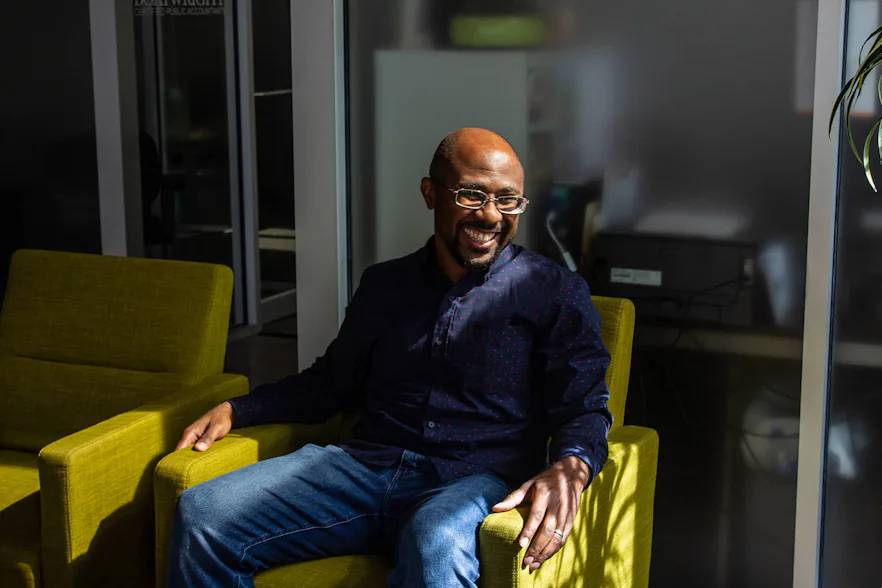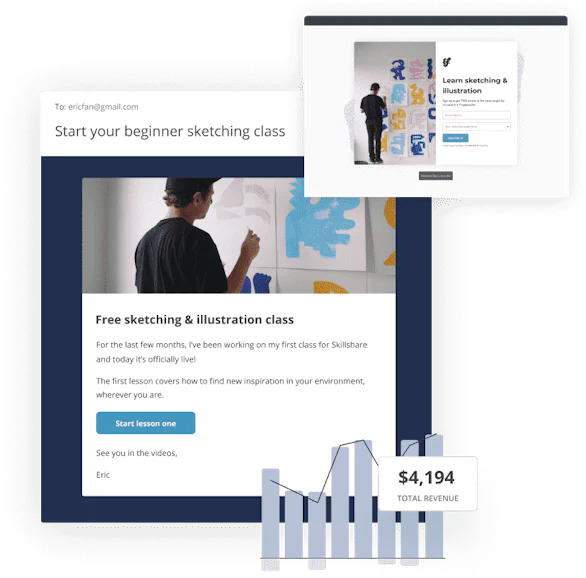Chris Craft’s first stories were told within stacks of carefully stapled construction paper.
When he got older, his stories turned into raps, which he performed at small community concerts in Houston (little kids would come up to him and his friends afterwards and ask them to autograph their paper plates).
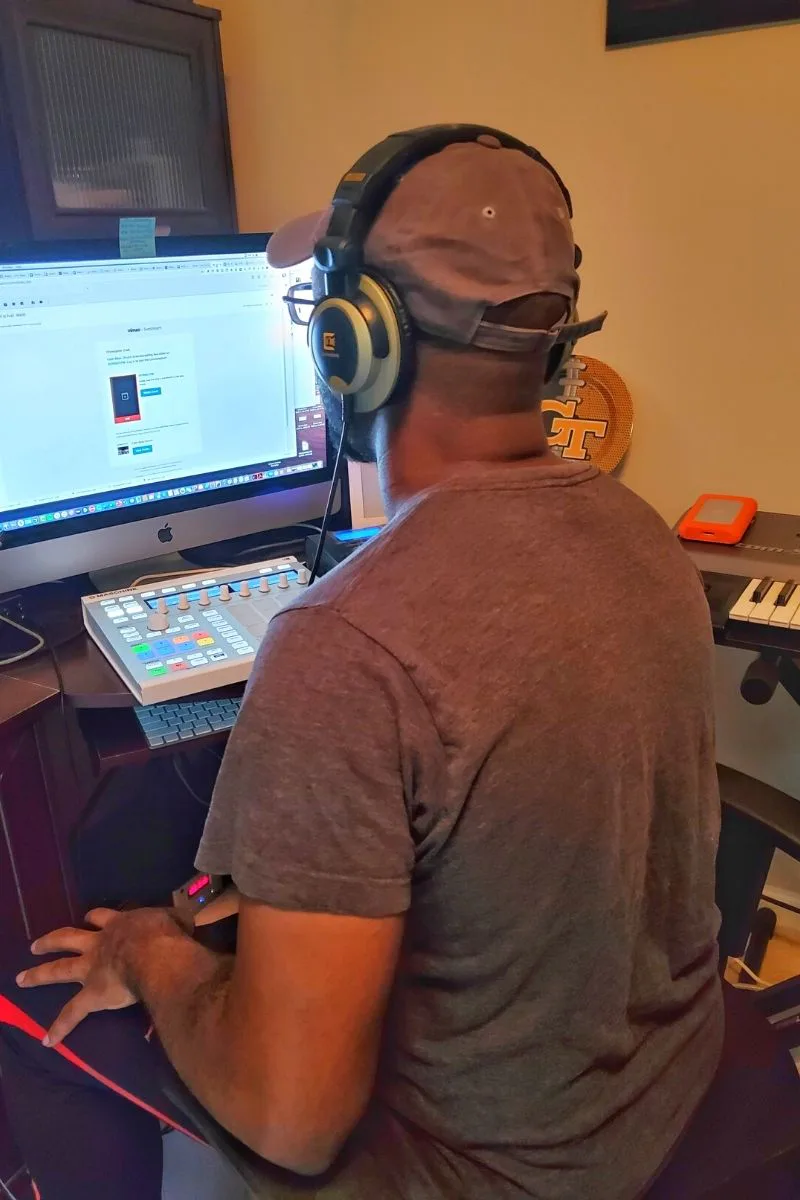
In high school, he reached out to magazines and wrote album reviews and interviewed artists for the Houston-based newspaper Urban Beat and Subculture in California.
It was his first taste of what it might be like to be a professional writer.
He loved it.
He knew he wanted to make a living in the arts.
But when he graduated high school, he went to college for electrical engineering.
“I felt like the creative side of me was dying.”
Chris was raised by a single father, Albert.
They didn’t have a lot of money for college, so when Chris heard about a NASA scholarship called the McNair (in the honor of Ronald E. McNair who died in the Challenger Space Shuttle explosion in 1986), which provided a full-ride to college as long as you majored in math, science, engineering, or technology – he applied. He liked math well enough.
He got the scholarship, and couldn’t turn down a free ride to college.
His dad was so proud.
Chris would start by spending three years at the prestigious Morehouse College in Atlanta and then two years intensely focused on just electrical engineering at Georgia Tech, earning two bachelor’s degrees.
I ask Chris if he ever planned on getting a job as an electrical engineer. He answers immediately:
No. Not at all.
So in 1997, when he wasn’t taking classes at Morehouse, he was pursuing his creative dreams with the people he met there. He wrote about music production and interviewed artists again, but this time for his own website, Alpha Beats. He also started an online music production competition called Battle of the Beats, one of the first online beat battles of its kind.

Chris’s vintage mixer.
And he started a record label with his friends who also happened to be McNair scholars as well. The scholarship also included a room and board stipend that they could use however they chose, so to save money Chris and his friends moved off campus and invested the extra money into music equipment.
They worked with a few young artists who were also friends of friends; Chris asks me if I’ve ever heard of Aloe Blacc, and it takes everything in me not to start singing, “I’m the man I’m the man I’m the man,” (Aloe Blacc’s lyrics from one of my favorite songs and music videos of all time).
He wanted to do some version of this – making and sharing – for the rest of this life.
Chris even produced a compilation CD that was accepted at Tower Records (at that time, you could sell music on consignment and then go back and pick up a check if anyone bought your music).
But when he came back a few weeks later to see if any sold, he was shocked by what he heard when he walked through the doors.
Tower Records was playing his CD in the store.
That was when he was hooked on the idea of being a creator. He wanted to do some version of this – making and sharing – for the rest of this life.
But then it was time to leave Morehouse and move on to Georgia Tech and start his electrical engineering classes. Their music production group, which they called The Divine Mind music collective, broke up as everyone had to go their separate STEM ways, and Chris’ free time began to disappear.
That’s when it got real. It was depressing because I felt like the creative side of me was dying, sacrificing itself for a degree.
“You’re almost at the finish line.”
Chris had to put writing and music (and almost everything else, really) on pause, just to survive the electrical engineering major – a subject known to be incredibly taxing even for those who love it. And Chris was still only doing it for the scholarship.
It was hard.
Really hard.
So much so that with only a semester and a half left, he decided to quit.
He couldn’t take it anymore.
He didn’t want to be an electrical engineer anyway. What was the point of this?
He was really depressed, and because of that his grades were slipping, something that had never happened before. He called his dad that night explaining why he was quitting, why he was leaving, why he was so down.
His dad Albert hung up the phone, got in his car, and drove 12 hours from Houston to Atlanta to console his beloved son.
He showed up on Chris’ doorstep the next day.
He gave him a hug.
He didn’t pressure him at all, but simply said:
You’re almost at the finish line. Don’t give up.
A few months later, Chris’ dad drove from Houston to Atlanta again – this time, to see his son graduate.
That meant a lot to him, and it meant a lot to me.
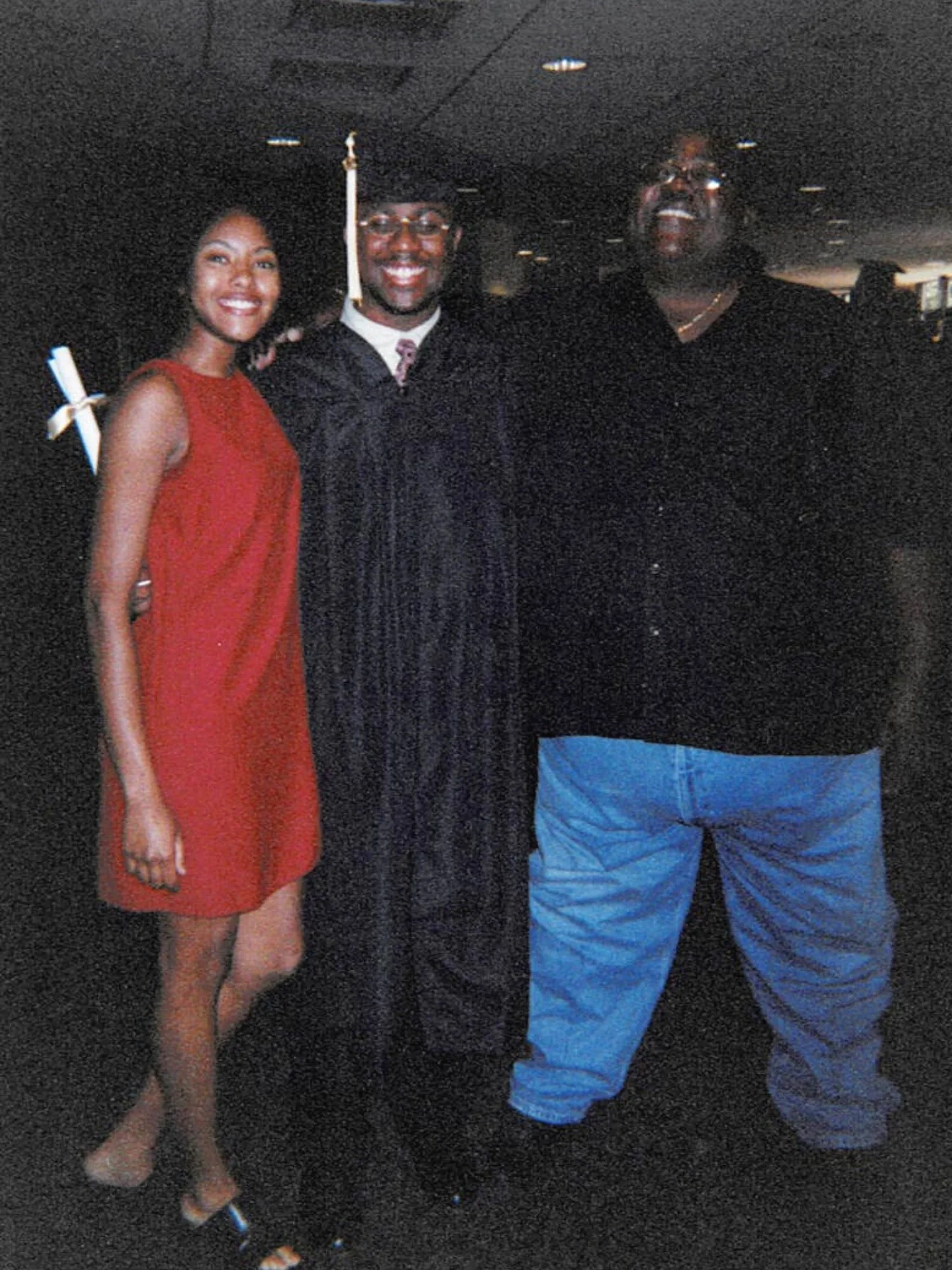
Chris at graduation with his dad Albert and his girlfriend-now-wife.
A few months after graduation, Albert passed away, on Chris’ birthday.
He left Chris with an incredible gift; Chris now knew he had the strength to finish anything he started, even when it seemed impossible.
“Oh, this business model is not quite working anymore.”
After graduation, Chris, with renewed faith in what he could accomplish, devoted all his time to starting a record label again.

Chris’s engineering diploma.
He reached out to his friend Lamar (whom he started the label with in college and who was now working at a NASA jet propulsion lab), to let him know he’d graduated.
He called him and said:
Lamar, I’m out. Let’s go.
They started a label again. Aloe Blacc was back. They also signed other hip-hop, soul, and avant-garde jazz artists, like Walé Oyéjidé (who went on to create the popular clothing label Ikiré Jones, as featured in Black Panther).
Chris ran that record label full time for five years.
But the music industry started to shift toward digital and they didn’t pivot as quickly as Chris wanted. He saw it coming, but struggled to convince others of the shift.
Before we knew it, there were CDs collecting dust, vinyls getting stacked up the wazoo; and it’s like ‘Oh, this business model is not quite working anymore.’
Soon after that, Lamar had to move away for a family emergency, and Chris didn’t enjoy running the label alone as much as with a partner. He could sense change in the air; he wanted to pivot, but he had no idea what to do next.
Then, one Sunday morning, his preacher said she wanted to start a blog for their church and she just knew that there was someone in the congregation who could help her start one.
“Oh, I could help them with that,” Chris thought. He remembered that first music blog he’d started in 1997, and all that he’d learned about the budding digital world when the music industry shifted.
“Oh, I could help them with that.”
He approached his preacher after the service and offered to help.
He didn’t expect the church to pay him for his services.
But they did.
So he incorporated a new business to accept the payment, a digital marketing agency named after his daughter Naomi: Nao Media.
The internet was his new construction paper – multicolored and alive and brimming with possibility. He grabbed his proverbial stapler and his new business took off – in every direction; he would later need a staple remover.
He could sense change in the air; he wanted to pivot, but he had no idea what to do next.
He stopped to ask himself what he loved doing the most.
Chris took every client and project that came his way. While he was making passive income (and still does) from the music catalog he’d built at the label, he had a family to support.
He needed all the clients he could get – and would do whatever they wanted: he created their websites, wrote their blog articles, managed their email lists, and managed all their social media channels.

Chris helped Aloe Blacc start his first website in 2010.
He helped ESPN sports journalist Bomani Jones launch his podcast, The Evening Jones.
He designed celebrity Chef Roblé Ali’s first website and helped create digital assets for his Food Network show.
That college kid who walked into Tower Records with a box of CDs was now helping all these creators share their creative work online.
But after three years of doing anything digital that clients needed, Chris was burnt out.
He didn’t really love creating websites or managing social media as much as he liked his clients.
After a few frustrating projects, he stopped to ask himself what he loved doing the most.
The answer: writing.
So in 2014, he said no to all other projects and shifted Nao Media to be a content-focused agency.
And around that same time, Chris also fell in love.
With SEO.
“It all starts with the words.”
The first time Chris learned about search engine optimization, he was fascinated: that kid who loved math and writing discovering how to merge both:
Knowing how to present copy that’s both friendly to search engines and friendly to humans who consume it? That is fun, because it’s like a puzzle to me.
How can I fit in these related keywords but still have it read like a piece of art?
And that’s what took his business to the next level, because most people weren’t expecting both.

Some clients just expected a nice blog post and knew nothing about SEO titles or meta descriptions or A/B tests.
Others just wanted the SEO optimized blog post and were blown away when it was actually incredibly well-written and engaging.
And at a time when long-form blog content seemed to be going out of fashion, when blogs seemed “dead” and marketing seemed all about the best social media photos, Chris doubled down on long-form written content, believing in its foundational power:
If you want to be relevant, you cannot ignore the written word; stories are here to stay.
Also, I think it’s a whole lot easier to repurpose content when you start with the words first.
If you just start with a long-form piece that has your H3s and H4s, what do those become?
Those become bullet points within a tweet. Those become a caption for Instagram, those become an outline for a podcast.
It all starts with the words.
Chris knew that just like music, no matter how business models or tactics shift – what stays the same is the ability for words and melody and artists to affect others with their work – however it’s shared.
“If you want to be relevant, you cannot ignore the written word; stories are here to stay.”
“These are real people that you’re communicating with.”
Chris also started blogging for himself, sharing what he was learning and loving about long-form content. He started an email list to share that content, using a simple RSS feed that automatically emailed his list every blog post. He didn’t put a lot of effort into it, he says: “[just] publish it and the computers will take care of it.”
Email was just one more information highway for his content.
But then, Chris stumbled on Kit.com, and there was something about the way we talked about email that shifted something for him – something I wouldn’t include normally at the risk of sounding like an ad, but Chris assures me that this is an integral part of his creator story, a defining shift in the way he thought about email:
Kit made me realize that the email inbox is an intimate meeting place, where people move toward a resolution.
You saw the art in communicating with people. You made the people on the other end more than email addresses. These are real people that you’re communicating with (and it didn’t hurt that you could tag and segment).
That’s what inspired me to switch to you all. [You] changed my paradigm on what email marketing really was.
Chris was even one of the winners of our 2020 Landing Page Challenge.
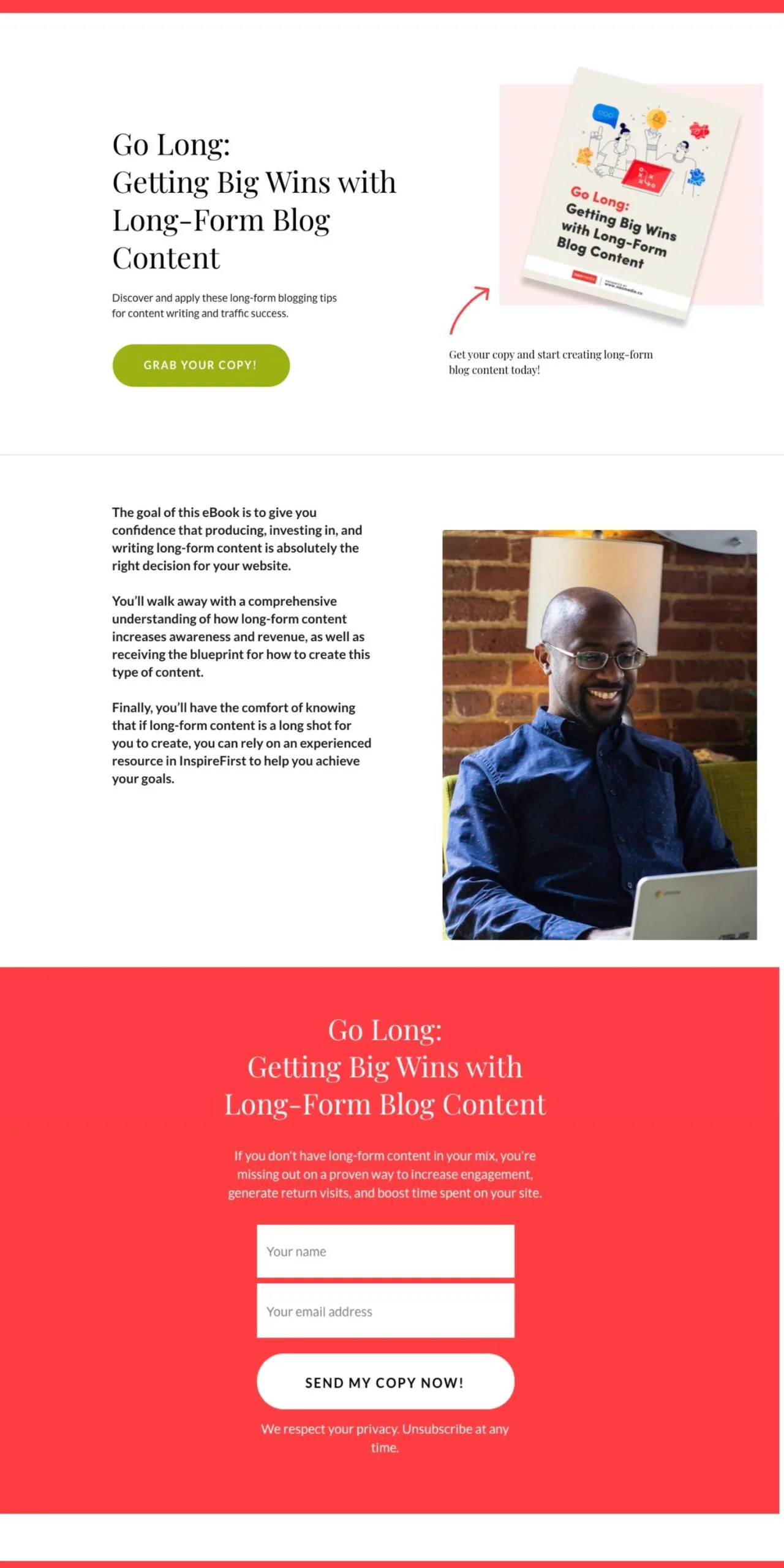
Chris’s winning landing page.
Chris started writing emails directly to his list, writing each one as if writing to a friend.
It worked.
His emails kept his clients engaged and coming back for more.
Just because you have them signed on as a client doesn’t mean you don’t need to still nurture them and edify them.
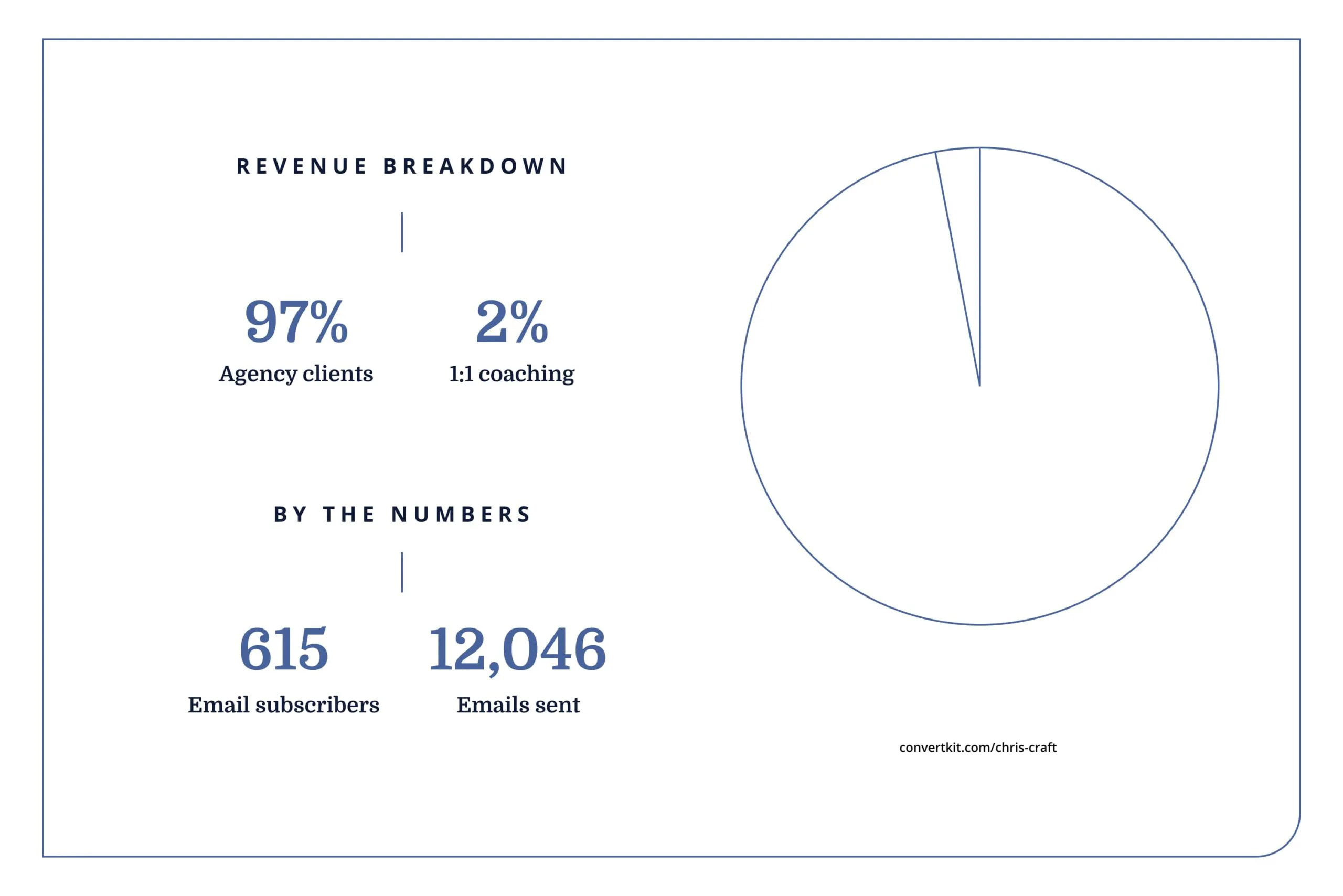
“Use it for good.”
When I ask Chris if he’s had a dream come true moment in his creator journey so far, I don’t expect what comes next, and yet it’s perfect.
His dream-come-true was writing a piece for his client Dr. Lipman at the Atlanta Fibroid Center, a long-form story about a mother and daughter who struggled with fibroid pain.
When I read the story, I get lost in it, forgetting that it was written by an SEO master. He includes quotes like “who wants to [live] like they’re dying every month for four days?”
When I read it a second time, I spot intelligent keyword placement and get chills, knowing that in this case those keywords will help women find this story when they’re googling for help (and for hope) with their pain.
When Chris loved music as a kid, his dad would always say: “Son, music is a powerful tool. Use it for good.”
That is my vision that I carry on within everything I do. Use your talents and steward it for good.
Even when life seemed to go off track, Chris always focused on doing his best, knowing now that it can all be useful: “Engineering taught me how to approach writing in a unique way.”
(He encourages anyone who wants more people to find their art to take an SEO training course, and for anyone who feels stuck on the technical side, he recommends to “Stop writing for a while and read some fiction; consume things outside of your bubble.”)
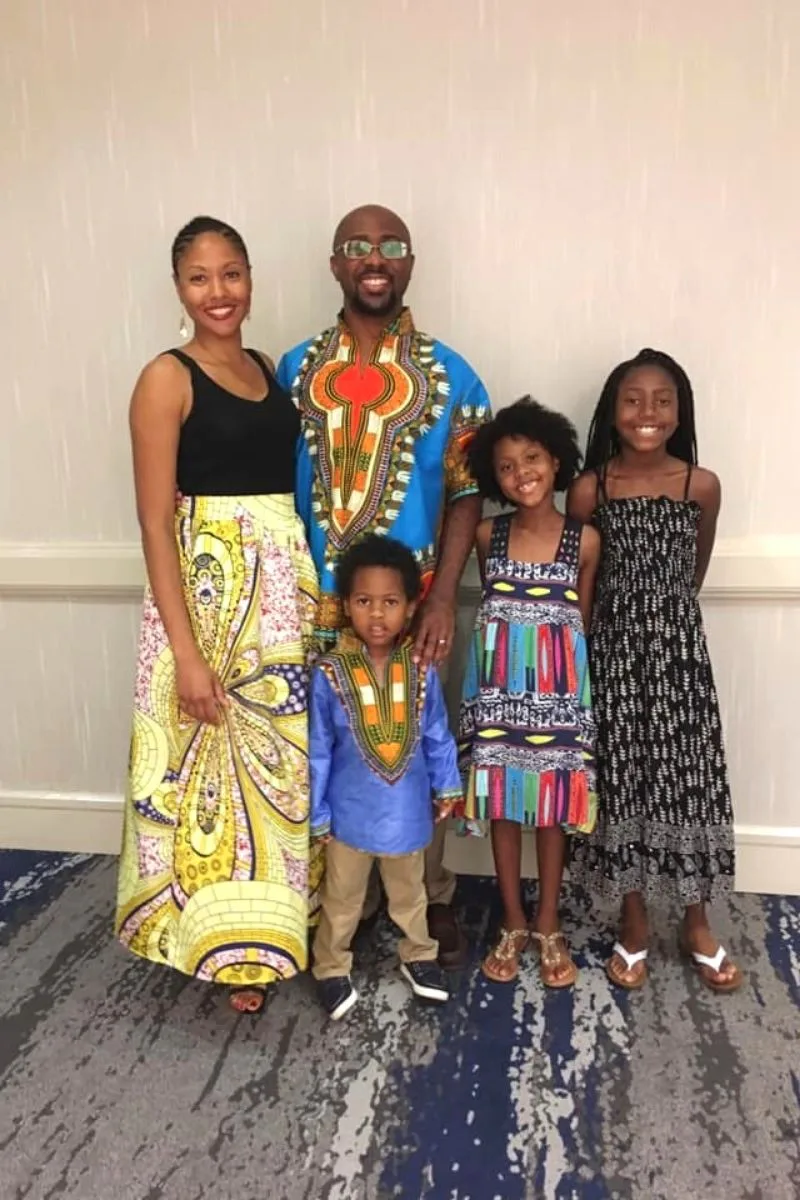
Chris with his family.
Just behind Chris, in his office where we chat, is a piano keyboard.
He still plays music all the time, mostly by ear, and he recently started a second company called GDMX Music, which serves as the umbrella for his music, podcast, and a new blog he started with his whole family.
Last night, a 12-year-old Naomi, walked into his office and said:
Dad, this summer when school is done, let’s start a website talking about music production.
I have no doubt that will happen this summer; I sense that Chris is unafraid to jump into new things.
His journey seems curiously devoid of drama – both external and internal.
But of course, that’s an illusion. The heartache, the ups and the downs – they were all there and always will be.
But Chris doesn’t dwell on those parts of the story.
I ask him where his strength and courage comes from, what drives him to always jump so instantly and fearlessly into the unknown – open mic nights, signing paper plates, walking into a huge record store gripping a small cardboard box of homemade CDs:
It’s faith. That if you believe you could do it and if it’s within your Creator’s will, it will happen, and there’s no force or power that could stop it.
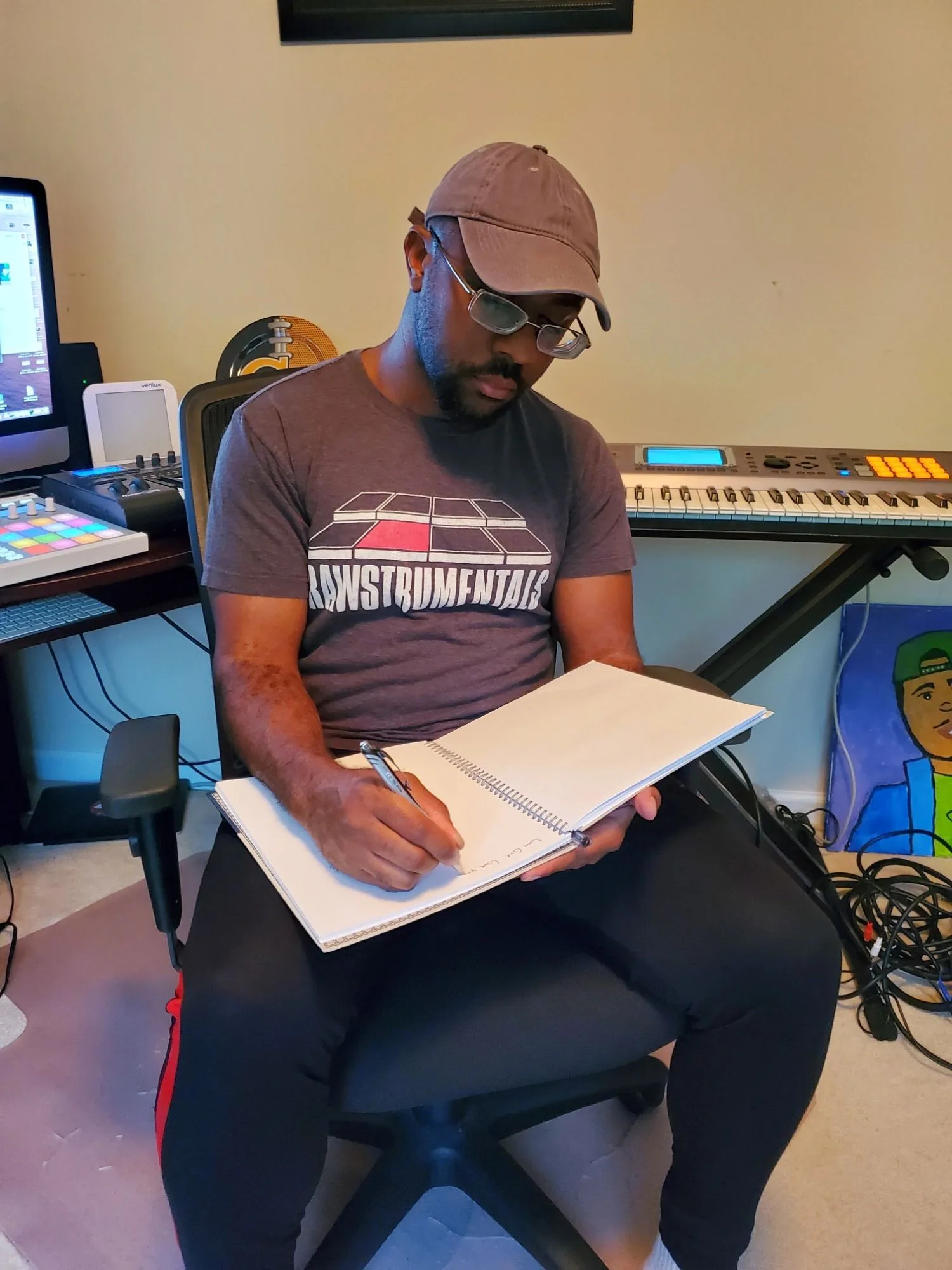
You can connect with Chris by joining his email list or learn more at naomedia.co.
Want to learn the top tips for engaging your email list? Catch the workshop replay with Chris Craft and Angel Marie, Creator Educator at Kit! You’ll get real, actionable steps to create undeniably readable emails while remaining productive along your creator journey.
